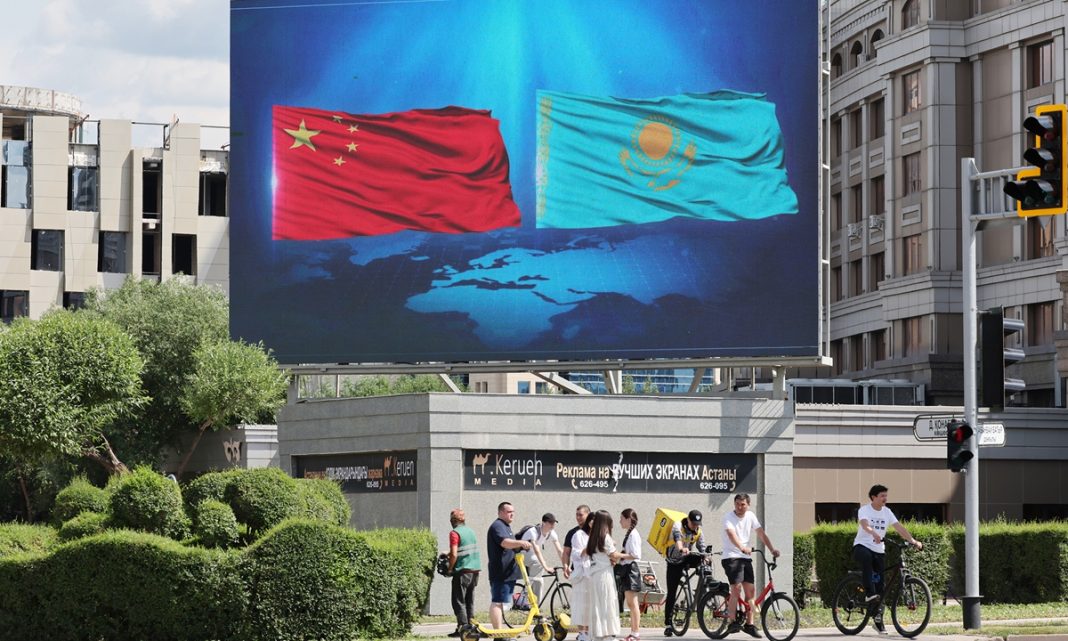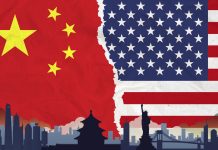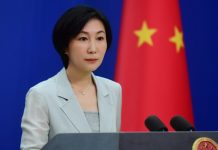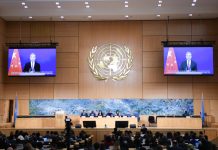BEIJING: While the second China-Central Asia Summit is set to open, preparations are in full swing in Astana as public and scholars eagerly anticipate the event, the Global Times observed on Sunday.
At the invitation of President of the Republic of Kazakhstan Kassym-Jomart Tokayev, Chinese President Xi Jinping will attend the second China-Central Asia Summit in Astana from June 16 to 18, a Chinese foreign ministry spokesperson announced on Friday.
Global Times reporters visited the summit venue, the Palace of Independence in Astana on Sunday, and observed that local staff were busily engaged in on-site arrangements. Preparations were in full swing to welcome leaders, delegates from China and the five Central Asian nations, as well as global media personnel.
The national flags of China and Central Asian countries are hoisted in front of the venue. This site, which previously hosted the Council of Heads of State of the Shanghai Cooperation Organization in 2024, serves as a pivotal venue for official functions, forums and conferences. Alongside prominent landmarks in Astana, such as the international airport, the Triumphal Arch and the Beijing Palace across Astana, Chinese flags were specifically raised.
A highlight of China-Central Asia Belt and Road cooperation, the Astana urban light railway – the first in Central Asia – marked a breakthrough with two trains lifted into place on June 11 and 12.
Ji Chenglong, executive project manager at China Construction Sixth Engineering Bureau Co., Ltd., which is building the transit project, told the Global Times on Saturday that the light rail, built to Chinese standards with fully automatic driverless technology, is expected to start trial runs in 2026.
On the day of the train lift, local crowds gathered, snapping photos and applauding as it settled, showing their excitement and expectation for the project. One local told media “Thanks to China!”
Global Times reporters also noticed that local mainstream media have consecutively published reports on the light rail progress on the front page and important sections two days before the summit convenes.
Pakizat Anuarhan, a Kazakh local working on the project, told the Global Times that “The speed of this light rail shows the ‘China speed.’” She said locals see the real benefits of China’s rapid development, which is why they are so focused on the summit and hope that more people-focused projects will emerge from the China-Central Asia mechanism. She added that the light rail will cut her commute time and ease the city’s heavy traffic.
In addition to ordinary people in Kazakhstan, the political, academic and media circles of the five Central Asian countries have also paid great attention to and are looking forward to this summit.
Kazakhstan’s Ambassador to China, Shakhrat Nuryshev, told the Global Times in a recent exclusive interview that the first China-Central Asia Summit launched a new regional collaboration model, and the second summit will inject fresh momentum into deepening ties.
“The China-Central Asia Summit has become a dialogue mechanism based on equality, good-neighborliness and mutual benefit. We believe the second summit will be a vital step toward building a unified space of cooperation and trust across Eurasia,” he stressed.
Sheradil Baktygulov, director of the Institute of World Policy of Kyrgyzstan, said that the shared political will of Xi and the leaders of Central Asia is key to the sustained development of China-Central Asia cooperation, the Xinhua News Agency reported.
“This cooperation not only strengthens bilateral ties, but also lays the foundation for a new model of multilateral collaboration in the Eurasian region,” he added.
Aygul Rahimova, a reporter from a Turkmenistan newspaper, told the Global Times on Sunday that the people of Turkmenistan are aware of the summit. Newspapers, television, and online resources are covering the upcoming events, generating interest among local people.
“As a journalist, I hope that this summit will serve as an important platform for strengthening ties between Turkmenistan and China, as well as with other Central Asian countries. We expect that issues such as economic cooperation, investment in infrastructure and energy projects will be discussed. Turkmenistan, with its rich natural resources, can benefit from joint projects with China, which in turn will contribute to the economic development of our country and improve the well-being of our people,” Rahimova said. –The Daily Mail-Global Times news exchange item






